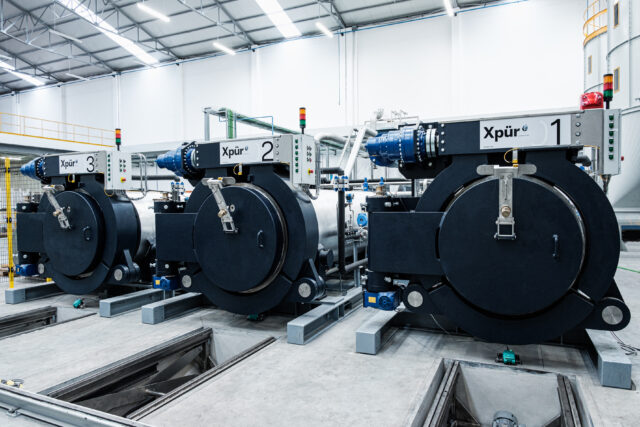This website uses cookies so that we can provide you with the best user experience possible. Cookie information is stored in your browser and performs functions such as recognising you when you return to our website and helping our team to understand which sections of the website you find most interesting and useful.
Amorim reveals details of ‘world’s greenest’ anti-TCA technologies
Following news announced exclusively by db last year, today Amorim has revealed the details of new technologies to eradicate detectable TCA* for every cork it makes, calling them the “world’s greenest”.
 As reported by db in December, the world’s biggest cork producer, Amorim, has delivered on a promise made 18 months ago to eliminate detectable TCA* for every cork it makes – which amounts to more than 5.5 billion stoppers annually.
As reported by db in December, the world’s biggest cork producer, Amorim, has delivered on a promise made 18 months ago to eliminate detectable TCA* for every cork it makes – which amounts to more than 5.5 billion stoppers annually.
News of the breakthrough came from a discussion with company chairman António Rios de Amorim in November, who confirmed that Amorim has developed cost-efficient technology to remove detectable TCA from all its product lines at no extra fee for the customer.
As we said last year, this is a big moment for cork, considering Amorim accounts for almost half of the market for the natural stoppers, and 30% of the total production of all closures.
The launch of the TCA removal technology today follows a commitment made by António 19 months ago during a conversation with db in Portugal.
Sitting in the one of the rooms of the historic Amorim family house, António said that Amorim would “eradicate TCA by 2020” – a milestone moment for the company as it marks 150 years since its foundation.
In a statement disseminated this morning, Amorim commented that its anti-TCA technologies are the “world’s greenest”, and comprise two systems, called Naturity and Xpür.
While Naturity has been developed to remove detectable TCA from whole-piece natural corks, Xpür is the name for a technique focused on cork granules for creating a new segment of micro-agglomerated stoppers, according to Amorim.
Research for the patent-pending Naturity technology began in 2016 with the NOVA School of Science and Technology, and is “based on the principles of thermal desorption through a proprietary, non-sequential use of pressure, temperature, purified water and time”, noted the Portuguese-based cork producer.
It also stressed that there are no artificial elements used in the process, which facilitates the extraction of 150+ volatile compounds, including TCA.
Launching worldwide today, Amorim pointed out that “Naturity expands non-detectable TCA performance in the natural cork product segment, while further strengthening the operational deliverables of NDTech” – the screening service that individually analyzes and removes any natural cork with more than 0.5 nanograms per liter (ng/L) of TCA (the level at which TCA is said to be detectable by humans).
Bottling trials with various wineries using corks treated with Naturity have yielded “exemplary results in measuring the treatment’s impact on cork performance”, said Amorim, adding that additional third-party validation trials are to be conducted “as soon as possible” with the Geisenheim Institute in Germany and the Campden & Chorleywood labs in the UK.
Another development announced today is Amorim’s Xpür technology, developed to expand the non-detectable TCA performance for micro-agglomerated stoppers.
According to Amorim, Xpür improves upon the conventional supercritical CO2 application developed several decades ago, reengineering and upgrading the concept with the latest technology, which is also more efficient: it uses 25% of the energy and 10% of the CO2 previously required.
Furthermore, the producer points out that Xpür achieves results of TCA reduction levels to 0.3 ng/L in treated micro-agglomerated stoppers, while leaving the physical-mechanical properties of cork intact.
As a result, Amorim’s range of micro-agglomerated corks features the highest possible percentage of cork and do not require additional chemical solutions to maintain cork’s natural properties, namely the all-important compressibility and expansion rates.
Xpür will be employed in the treatment of technical stoppers Neutrocork Premium and QORK – the latter employing a binding agent made using 100% polyols from vegetable origin.
Amorim said that such a development is expected to reduce the amount of single-use plastic stoppers in the world by several million units.
Commenting on the anti-TCA technologies, António Amorim, chairman and CEO of the company, said: “These technologies come as a result of robust financial investments, time, and dedication to R&D from our team. Despite the obstacles of 2020, we were able to fulfill the promise we made to have non-detectable TCA performance for all the cork stopper segments by the end of the year. This is our commitment to our 30,000 customers around the world – to guarantee the quality and consistency of their products and ensure that consumers’ preference for cork will only grow stronger.”
* TCA is a a wine spoilage compound that can originate in cork. It tends to give the wine a smell of wet cardboard. TCA is a shortening of the chemical compound’s full name, which is 2,4,6-trichloroanisole. Amorim’s non-detectable TCA guarantee means that if there is any remnant of TCA in the cork, it is below the human detection threshold, which is said to be around 0.5 nanograms/litre.
Read more
DB EXCLUSIVE: THE WORLD’S BIGGEST CORK PRODUCER ANNOUNCES TCA BREAKTHROUGH
THE BIG INTERVIEW: ANTÓNIO RIOS DE AMORIM




Excellent, well-written article. I had the pleasure of touring the Amorim facility in 2013 and was very impressed with the steps they were taking to eradicate TCA at that time. I was also pleased to see how they use virtually 100% of the cork with cork leftovers – soles for shoes, floor tiles, car insulation, etc.